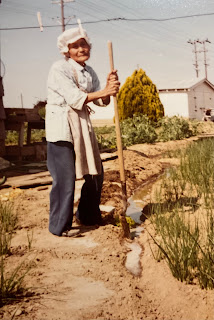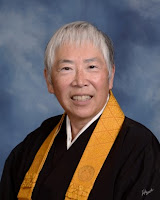
Simple...Like Ochazuke
One of the simple pleasures that my mom misses now that she is residing in an assisted living community is Japanese rice. She mentions “ochazuke,” a comfort food that I remember from my childhood. Nothing was more enjoyable than a chawan (bowl) of rice with ocha (tea) poured over it. Slurping this bowl of rice along with tsukemono (pickled vegetables) was a favorite at mealtime. It certainly was not a fancy dish, and it did not take a long time to prepare. Even I could manage to make ochazuke! So I was surprised when I did a Google search for “ochazuke” and found that there are actual recipes for making ochazuke--I cannot imagine that someone would need a recipe! Its awesome-ness lies in its simplicity...and all the childhood memories that come along with the flavors.
I, and many other Shin Buddhists of my generation, who grew up going to a Jodo Shinshu temple, experience the same feeling of simplicity with our practice of reciting the name of Amida Buddha. The nembutsu, saying or thinking “Namo Amida Butsu,” has a familiarity about it that brings a sense of contentment. It brings back memories of our grandparents in the temple, murmuring the nembutsu as they waited for service to begin. Even if we could not understand much of the service that was conducted in Japanese, we could recognize “Namo Amida Butsu.” We would place the palms of our hands together in gassho and recite "Namo Amida Butsu" with the Sangha. This easy practice expanded our awareness of all the causes and conditions that make our lives possible. The nembutsu brings back memories of both joy and sadness and allows us to appreciate our precious lives.
Here is a picture of my grandmother, Ayano Yokoyama, in her late 70s, tending her beloved garden
However, much like the recipes for ochazuke I found on the worldwide web, the idea that making ochazuke and saying "Namo Amida Butstu" are "simple" can be deceiving. Maybe the idea is easy, but the actual doing is not so easy.
We are often taught that the heart of Shin Buddhist practice is to just live your life with purpose and compassion. We are told that every one of us is embraced by the wisdom and the compassion of Amida Buddha. This understanding of the universal compassion of Amida reminds us that everyone we meet deserves to be treated kindly and compassionately.
The practice of being kind and compassionate should be easy, don’t you think? But recognizing that each and every person is embraced by the wisdom and the compassion of Amida Buddha, and that we should treat them accordingly, is actually really hard! It is easy enough to accept that friends and family are embraced by the wisdom and compassion of the Buddha, but what about strangers or people we might consider as enemies? Can we see them embraced by Amida’s Wisdom and Compassion each and every day? Or do we need to be reminded in order to keep us on track?
Maybe ochazuke is not such an easy dish. It may be easy to create--a bowl of rice soaking in tea is not so difficult to put together. However, the problem may be in how we eat it. Do we just slurp it down with no further thought? Do we throw tsukemono on top and let it all wash down together? Or, do we appreciate all the causes and conditions that brought the rice, tea, and vegetables to our kitchen? Do we think about those that harvested the rice, tea leaves, and vegetables? You may feel that ochazuke is "easy," but appreciating it with gratitude each and every time is not so easy.
Seeing everyone on a daily basis as being embraced by Amida’s Wisdom and Compassion is also not so easy. We encounter difficult people every day. It is not easy to live our lives compassionately, especially since we are exactly like all those people that we may regard as incompetent, unfair, rude, or greedy. When we say "Namo Amida Butsu" we are reminded of Amida's compassion for all of us.
Calligraphy of the Nembutsu "Namo Amida Butsu"
Next time you have that ochazuke (or any other dish), be mindful and really savor it. Think about all the causes and conditions that make the ochazuke possible. Similarly whenever you meet someone, consider and appreciate who they are and what they've been through. Please savor and appreciate everything and everyone in your life.
Pictures and recipe for ochazuke can be found at https://rasamalaysia.com/green-tea-rice/
In Gassho,
Rev. Kathy Chatterton
Assistant Minister, Idaho-Oregon Buddhist Temple




